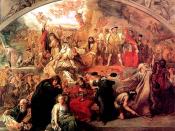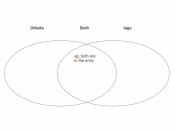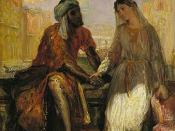Contextual Notes on William Shakespeare'sOthello
SETTING
It's not surprising that Shakespeare chose Venice as the setting of a story filled with passion, jealousy, and sexual tension. For the Elizabethans, the Italians were a wicked people, living lives of treachery, murder, and loose morals. When playwrights of the day wanted to portray wickedness, they often created Italian characters causing problems in England, or set the plays in Italy.
Venice was particularly exciting to the English. The women there were rumored to be very beautiful, and very interested in making love. Venetian men were considered hot-tempered, aggressive, and easily jealous. An Elizabethan audience watching Othello would have been highly suspicious of Desdemona and her behavior. Running off to get married behind your father's back was simply not done. Because Desdemona was Venetian, however, audiences wouldn't have been too surprised. As for Iago, he probably represented the kind of villain Elizabethans thought ran rampant throughout Italy!
One interesting note is that the name Iago is Spanish.
(The Italian form is Giacomo.) Shakespeare gave his most evil character a Spanish name, probably because Spain was England's worst enemy. Italy may have been the home of romantic, exotic sin, but true evil, according to the Elizabethans, came from Spain!
THE ELIZABETHAN THEATER
The theaters in which Shakespeare's plays were first performed were quite different from those of today. You're probably accustomed to theaters in which the seats face a square stage with a proscenium arch (a "frame" that separates the audience from the actors). Elizabethan theaters were either circular or made of six, seven, or eight sides. The sides enclosed an open court surrounded above by galleries or balconies. Audience members stood or sat in the galleries or (if they couldn't afford gallery seats) sat downstairs on the bare ground-these spectators came to be...


